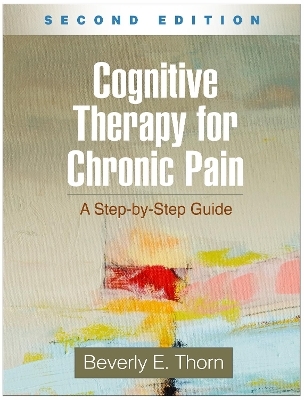
Cognitive Therapy for Chronic Pain, Second Edition
Guilford Press (Verlag)
978-1-4625-3169-1 (ISBN)
New to This Edition
*Incorporates over a decade of important advances in pain research and clinical practice.
*Treatment modules that allow clients to enter a group at any point after an introductory session.
*Expanded with motivational enhancement, relaxation, and mindfulness techniques.
*Many new handouts, assessment tools, and therapist scripts, as well as audio downloads.
*Orients and engages clients using state-of-the-art research on how the brain processes pain.
Beverly E. Thorn, PhD, ABPP, is Professor Emerita of Psychology at the University of Alabama, where she was on the faculty for 30 years, including serving as Director of the Clinical Psychology PhD program for 15 years. She is the recipient of the 2018 Wilbert E. Fordyce Clinical Investigator Award from the American Pain Society, and is a Fellow of the Society for Health Psychology (Division 38 of the American Psychological Association (APA)), the Society of Clinical Psychology (Division 12 of the APA), and the Society of Behavioral Medicine. Dr. Thorn is on the editorial boards of several scientific journals, including Health Psychology, Pain, Journal of Pain, and European Journal of Pain. Her research has focused on investigating the important components of CBT for chronic painful conditions. Since retiring in 2016, she has remained actively involved in dissemination and implementation of CBT for chronic pain with low-income, multiply disadvantaged populations. She also consults in health care settings to help train behavioral health providers to implement CBT for pain management.
I. Rationale, Theory, Research, and Assessment
1. Why Consider Cognitions When Treating Chronic Pain?
2. Conceptual/Organizational Model and Treatment Rationale: Cognitive Therapy for Chronic Pain
3. The Research Foundation for Cognitive Treatment of Pain
4. Clinical Assessment of Pain from a Biopsychosocial Perspective
II. A Cognitive Treatment Program for Chronic Pain
Treatment Module 1. The Brain in Pain: Rationale for Cognitive Therapy
Treatment Module 2. The Stress–Judging–Pain Connection
Treatment Module 3. Identifying Automatic Thoughts
Treatment Module 4. Examining Our Thoughts and Creating New Ones
Treatment Module 5. Muscle Relaxation and Coping Self-Statements
Treatment Module 6. Deeper Beliefs
Treatment Module 7. Observing and Letting Go
Treatment Module 8. Writing about Strong Emotions: Another Way of Acknowledging and Letting Go
Treatment Module 9. Assertiveness: A Great Way to Communicate
Treatment Module 10. Putting It All Together
Appendices
Appendix A. Brief Pain Inventory—Short Form (BPI-SF)
Appendix B. P4 Suicidality Screener (P4)
Appendix C. Pain Catastrophizing Scale (PCS)
Appendix D. Tampa Scale for Kinesiophobia–11 (TSK-11)
Appendix E. Pain Self-Efficacy Questionnaire (PSEQ)
Appendix F. Patient Global Impression of Change Scale
Audio Downloads
1. Diaphragmatic (Belly) Breathing
2. Passive Muscle Relaxation
3. Mindfulness Relaxation
| Erscheinungsdatum | 30.11.2017 |
|---|---|
| Verlagsort | New York |
| Sprache | englisch |
| Maße | 203 x 267 mm |
| Gewicht | 800 g |
| Themenwelt | Medizin / Pharmazie ► Medizinische Fachgebiete ► Psychiatrie / Psychotherapie |
| Medizin / Pharmazie ► Medizinische Fachgebiete ► Schmerztherapie | |
| Medizin / Pharmazie ► Studium | |
| Sozialwissenschaften ► Soziologie | |
| ISBN-10 | 1-4625-3169-5 / 1462531695 |
| ISBN-13 | 978-1-4625-3169-1 / 9781462531691 |
| Zustand | Neuware |
| Haben Sie eine Frage zum Produkt? |
aus dem Bereich


